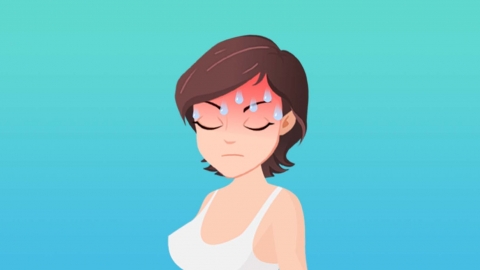What causes frequent sweating of the head?
Under normal circumstances, frequent sweating of the head may be caused by high environmental temperature, emotional stress, hyperhidrosis, hyperthyroidism, or menopausal syndrome. It is recommended to seek medical attention promptly to identify the underlying cause and receive appropriate symptomatic treatment under a doctor's guidance. Specific analysis is as follows:

1. High environmental temperature: In hot environments or when wearing excessively thick clothing, the body regulates its temperature through sweat gland activity. Since the head has abundant sweat glands, it is prone to increased sweating. Lowering the ambient temperature appropriately, choosing breathable and moisture-wicking clothing and hats, and avoiding stuffy, overheated conditions can help alleviate this condition.
2. Emotional stress: Prolonged anxiety, excessive pressure, or frequent mood fluctuations can stimulate sympathetic nervous system activation, leading to increased sweat secretion from glands in the head. Maintaining a calm mindset, regulating emotions through deep breathing or meditation, avoiding excessive tension, and seeking psychological counseling when necessary can help manage this issue.
3. Hyperhidrosis: Caused by sympathetic nervous system dysfunction or genetic factors, this condition is characterized by abnormally excessive sweating in localized areas, with frequent and heavy sweating on the head. Topical treatments such as aluminum chloride solution, methenamine solution, or formaldehyde solution may be used according to medical advice.
4. Hyperthyroidism: Excessive secretion of thyroid hormones accelerates metabolism, increases heat production, and stimulates sweat glands, resulting in symptoms such as head sweating, palpitations, and hand tremors. Medications such as methimazole tablets, propylthiouracil tablets, or carbimazole tablets may be taken under medical supervision to inhibit thyroid hormone synthesis and relieve symptoms.
5. Menopausal syndrome: During perimenopause, ovarian function declines and estrogen levels fluctuate, causing vasomotor symptoms such as episodic sweating in the head and neck. Medications such as nylestriol tablets, estradiol valerate tablets, or tibolone tablets may be prescribed to regulate hormone levels and improve symptoms.
In daily life, maintain good scalp hygiene by cleaning or drying sweat promptly to prevent prolonged accumulation. Choose breathable hair and skin care products to minimize scalp irritation, maintain regular sleep patterns and avoid staying up late, eat a light diet, reduce intake of spicy and stimulating foods, and support normal metabolic function of the body.






